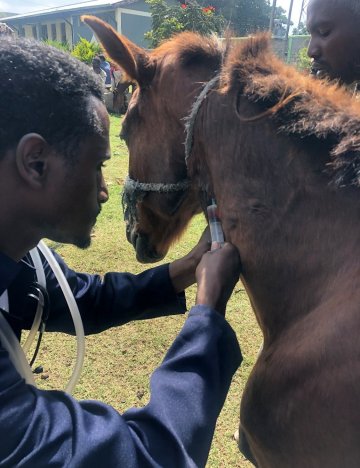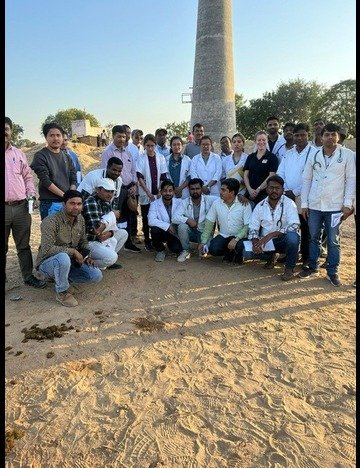The Animal Health Mentoring Framework allows us to imagine a world where Brooke is no longer needed
Brooke's groundbreaking Animal Health Mentoring Framework was first developed 10 years ago. Laura Skippen, Brooke's Senior Manager of Global Animal Health, discusses its long-lasting impact.
Brooke has been caring for working animals for nearly 90 years, yet our ultimate aim should be to become unnecessary. Even the best-kept animals will always need competent and compassionate vets and these vets should live and work where they are needed. In recent years, we’ve shifted from providing direct treatment to animals and instead focused on strengthening existing health services, so that more owners can access first aid and preventative healthcare for their animals from trusted local vets or paravets, long after Brooke has moved on.
10 years ago in June 2013 a group of vets from all over the world took part in a workshop in India to develop what was to become Brooke’s key tool for training and mentoring animal health practitioners (AHPs); the Animal Health Mentoring Framework (AHMF). We needed to create a way of training AHPs that didn’t involve them having to travel miles to be trained, missing valuable days of income and instead allowed them to continue to work whilst improving their practical skills. At the end of two weeks of trial and error we had developed a competency list of necessary skills that were critical for being able to treat working equids in a welfare friendly way.

Many iterations later, (with a lot of valuable input from international colleagues reminding us that the tool needed to be useful in all settings, including when standing by an animal in a brick kiln in 45 degrees heat, with an owner who wants the animal to be treated quickly!), the tool had been tested in Ethiopia, Kenya, Jordan and Pakistan and revised to its current format.
The AHMF supports AHPs to develop their competencies in five areas; Animal Welfare Advocate, Communicator, Clinical Expert, Kit content and Maintenance, and Clinical Governance (record-keeping, disease surveillance, clinical waste disposal). It is primarily a training tool and is now used in universities in Kenya, Ethiopia and Pakistan to assist in training veterinary students where previously there was little practical training in place.
Brooke vets visit AHPs to act as mentors and watch them perform their daily work, only stepping in to assist if they see something that would be detrimental to the animal’s welfare. This hands-off approach ensures that owners continue to trust the skills of their AHP. After the AHP has finished, there is then a debrief session to discuss how the AHP feels they handled the case and work on any areas for improvement. Thus each AHP, who may ordinarily have had little support or referral system for challenges they face, has a mentor to support them in improving their clinical skills and their business, making it a win for both AHPs and animals, who receive better quality, welfare-friendly treatment. In fact in a recent review of the AHMF all the owners interviewed reported positive improvements in the treatment they received from mentored AHPs, with particular emphasis on better communication skills, better animal handling and better knowledge on disease diagnosis and preventative healthcare.

Whilst the AHMF’s most important function is to support AHPs to deliver the best quality healthcare possible to hard working animals, it doesn’t just do this by mentoring. When teams review results globally we’re able to spot where there are problems that can’t be solved individually. This has helped inform our essential medicines work in Ethiopia, where the team noted that kit content scores were consistently low because no AHPs could stock pain relief medicine (considered critical for animal welfare). The resultant project, led by the Brooke Ethiopia team, has led to the pain relief medication meloxicam becoming available in Ethiopia. In 2022 I was lucky enough to see this being used on many needy animals in a government health post in Shashamene. A sustainable supply being available to AHPs all across Ethiopia is a huge benefit to working equids and many other livestock species that have not had access to the most basic pain relief before.
It certainly didn’t happen overnight, but 10 years later the Animal Health Mentoring Framework has been used to support and mentor over 4000 animal health practitioners. It has helped provide the evidence for gaps in health systems that Brooke teams can now work to address with the proof to support our advocacy. In February 2023, nearly 10 years on from that first workshop in India, a new cohort of Brooke India vets were trained to continue mentoring animal health practitioners to become capable and compassionate advocates for the welfare of working equids and help achieve Brooke’s vision of sustainable animal healthcare systems that are universally available for all species.
